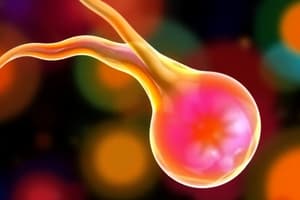Podcast
Questions and Answers
What is the primary function of the reproductive system?
What is the primary function of the reproductive system?
- Regulating heartbeat
- Balancing blood sugar levels
- Supporting brain function
- Producing gametes (correct)
What is a crucial role of the reproductive system?
What is a crucial role of the reproductive system?
- Maintaining overall well-being (correct)
- Creating blood cells
- Digesting food
- Regulating bone growth
What occurs in the female reproductive system during the menstrual cycle?
What occurs in the female reproductive system during the menstrual cycle?
- Controls breathing
- Regulates the final preparation of the egg (correct)
- Supports muscle contraction
- Filters waste from the blood
What is the primary process in males that ensures continuous production of sperm?
What is the primary process in males that ensures continuous production of sperm?
What important factor contributes to infertility in about 1 in 6 adult couples in the United States?
What important factor contributes to infertility in about 1 in 6 adult couples in the United States?
How can deficits in reproductive function in livestock and wildlife impact society?
How can deficits in reproductive function in livestock and wildlife impact society?
What can high milk yield in dairy cows lead to at the time of implantation and gestation?
What can high milk yield in dairy cows lead to at the time of implantation and gestation?
Why has research in the field of reproduction lagged behind other areas of biology?
Why has research in the field of reproduction lagged behind other areas of biology?
What has reproductive research been largely associated with?
What has reproductive research been largely associated with?
What area has seen significant advancements in recent decades according to the text?
What area has seen significant advancements in recent decades according to the text?
What is a common issue related to the reproductive system?
What is a common issue related to the reproductive system?
What does reproductive research aim to improve understanding of and address?
What does reproductive research aim to improve understanding of and address?
Study Notes
The reproductive system is a complex network of organs and hormones that work together to produce gametes and regulate hormone production. This system is responsible for the production of sex cells (sperm in males and eggs in females) and the release of sex hormones, including estrogen and testosterone. In addition to these primary functions, the reproductive system plays a crucial role in maintaining overall well-being and health.
The reproductive system in males and females reflects a highly dynamic underlying physiology, with continuous production of gametes and sex hormones throughout adulthood. In the female reproductive system, the menstrual cycle regulates the final preparation of the egg for fertilization and pregnancy, as well as the function of other systems in the body, such as the uterus and mammary glands. In males, spermatogenesis from stem cells ensures the continuous production of sperm. The reproductive system is not static, and its function changes throughout life, from birth to old age.
Infertility is a common issue in both humans and animals. In the United States, nearly 1 in 6 adult couples are infertile, with issues occurring in both men and women. The quality of human sperm has been found to be poorer than that of other species, and the time-to-pregnancy statistics, even among young people, are longer than one would expect. In livestock and wildlife, deficits in reproductive function can have significant economic and conservation implications. For example, high milk yield in dairy cows can lead to negative energy balance at the time of implantation and gestation, while selection for high fecundity in pigs has resulted in increased fetal morbidity and runting.
Despite the importance of the reproductive system, research in this area has lagged behind other areas of biology. This is due to a variety of factors, including the relative low impact of reproductive research journals compared to other fields, as well as a perception that reproductive research is largely focused on infertility and contraception, which are often seen as socio-economic issues rather than medical ones. However, research in reproduction has made significant strides in recent decades, particularly in the area of assisted reproductive technology (ART) and reproductive biotechnology. These advancements have opened up new opportunities for human reproduction, as well as for livestock species and endangered wildlife.
In conclusion, the reproductive system is a vital organ system that plays a crucial role in the production of gametes and sex hormones, as well as maintaining overall well-being and health. Infertility is a common issue, and research in this area has made significant strides in recent decades. However, there is still much work to be done to improve our understanding of the reproductive system and to address the challenges faced by individuals and couples experiencing reproductive issues.
Studying That Suits You
Use AI to generate personalized quizzes and flashcards to suit your learning preferences.
Description
Test your knowledge on the complex network of organs, hormones, and functions of the reproductive system, as well as common issues like infertility. Learn about the roles of gametes, sex hormones, and the menstrual cycle in both males and females. Explore the challenges faced in human and animal reproduction, and advancements in reproductive research.



